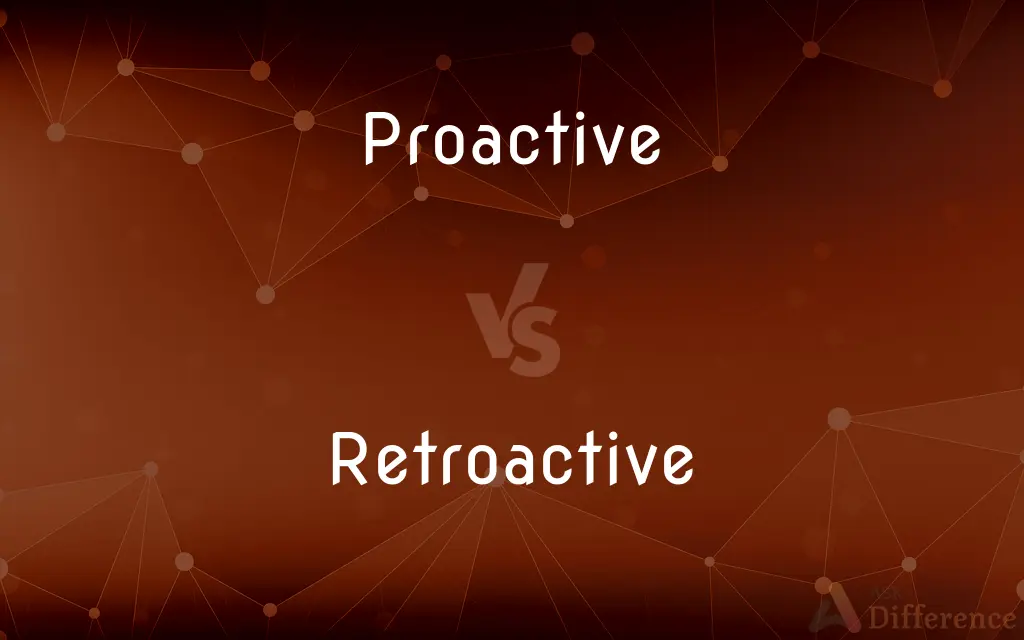Proactive vs. Retroactive — What's the Difference?
By Urooj Arif & Fiza Rafique — Updated on March 27, 2024
Proactive actions anticipate future challenges and act in advance, while retroactive measures respond to events after they occur, focusing on reaction and remedy.

Difference Between Proactive and Retroactive
Table of Contents
ADVERTISEMENT
Key Differences
Proactive approaches involve taking initiative and action in anticipation of future events or challenges, aiming to prevent problems before they occur or to seize opportunities early. This forward-thinking strategy is characterized by planning, foresight, and prevention, focusing on creating favorable outcomes and minimizing risks. On the other hand, retroactive measures are taken in response to events that have already happened. This approach is more about reaction than prevention, dealing with consequences, solving problems after they arise, and often involves corrective actions to mitigate the impact of unforeseen events.
While proactive strategies require continuous monitoring, trend analysis, and planning, they offer the advantage of greater control over outcomes and the ability to shape future conditions favorably. Retroactive actions, although sometimes necessary, can limit options to those that are available after the fact, potentially leading to less optimal outcomes and higher costs in terms of resources and opportunities missed.
In a business context, being proactive might involve conducting market research to anticipate customer needs and developing new products accordingly, whereas a retroactive approach would deal with customer complaints and market shifts as they happen, possibly losing market share in the process. Proactivity is about setting the pace and direction, while retroactivity often involves playing catch-up.
Cultivating a proactive mindset encourages innovation, resilience, and strategic thinking, allowing individuals and organizations to adapt more quickly to change and to influence their environment actively. Conversely, a predominantly retroactive stance can result in stagnation, as it focuses more on dealing with past issues than on creating future opportunities.
Despite their differences, both approaches have their place in effective management and personal conduct. A balance between proactive planning and the flexibility to respond retroactively to unexpected challenges can provide a comprehensive strategy for navigating complex environments and achieving long-term success.
ADVERTISEMENT
Comparison Chart
Definition
Acting in anticipation of future needs or issues
Responding to events after they have occurred
Focus
Prevention, planning, foresight
Reaction, correction, mitigation
Strategy
Anticipate and shape future conditions
Deal with consequences and correct past actions
Benefits
Greater control, minimizes risks, fosters innovation
Allows for direct responses, adaptable to past events
Challenges
Requires resources for planning and analysis
May involve higher costs and limited options
Example in Business
Market research to anticipate customer needs
Addressing customer complaints after product launch
Outcome
Can lead to innovation and strategic advantage
Often focuses on solving problems, can lead to missed opportunities
Compare with Definitions
Proactive
Aimed at prevention and early opportunity capture.
Proactive customer service anticipates and addresses issues before complaints arise.
Retroactive
Aimed at correcting or mitigating past actions.
The law was applied retroactively to address previous oversights.
Proactive
Involving advance planning and foresight.
They took proactive measures to secure the data against breaches.
Retroactive
Focused on reaction rather than prevention.
Retroactive analysis helped understand the project's failures.
Proactive
Taking action in preparation for future events.
A proactive approach to health can prevent diseases.
Retroactive
Acting in response to past events.
Retroactive policies compensated those affected by the outage.
Proactive
Focused on shaping the future.
The company's proactive strategy kept it ahead of industry trends.
Retroactive
Often dealing with problem-solving after the fact.
Implementing retroactive safety measures after an accident.
Proactive
Characterized by initiating change rather than reacting.
Proactively updating software to prevent vulnerabilities.
Retroactive
Involves adapting to consequences of unforeseen events.
Retroactively adjusting budgets due to unexpected expenses.
Proactive
(of a person or action) creating or controlling a situation rather than just responding to it after it has happened
Employers must take a proactive approach to equal pay
Retroactive
Influencing or applying to a period prior to enactment
A retroactive pay increase.
Proactive
Acting in advance to deal with an expected difficulty; anticipatory
Proactive steps to prevent terrorism.
Retroactive
Extending in scope, effect, application or influence to a prior time or to prior conditions
Proactive
Acting in advance to deal with an expected change or difficulty
We can deal with each problem as it pops up, or we can take a proactive stance and try to prevent future problems.
Retroactive
Fitted or designed to retroact; operating by returned action; affecting what is past; retrospective.
Proactive
Descriptive of any event or stimulus or process that has an effect on events or stimuli or processes that occur subsequently;
Proactive inhibition
Proactive interference
Retroactive
Descriptive of any event or stimulus or process that has an effect on the effects of events or stimuli or process that occurred previously
Proactive
(of a policy or person or action) controlling a situation by causing something to happen rather than waiting to respond to it after it happens
Retroactive
Affecting things past;
Retroactive tax increase
An ex-post-facto law
Retro pay
Common Curiosities
What role does analysis play in proactive strategies?
Analysis is crucial in proactive strategies for identifying trends, potential risks, and opportunities, allowing for informed decision-making and planning.
Is there a cost difference between proactive and retroactive actions?
Generally, proactive actions require upfront investment in planning and prevention, but can ultimately be more cost-effective than the often higher costs of retroactive problem-solving.
Are there situations where a retroactive approach is preferable?
Yes, in cases where it's impossible to predict certain events or when flexibility is needed to adapt to unexpected changes, a retroactive approach can be more appropriate.
How can one develop a more proactive mindset?
By focusing on future goals, staying informed about relevant trends and potential risks, and engaging in continuous planning and foresight exercises.
What is the main difference between proactive and retroactive approaches?
The main difference lies in timing; proactive approaches are taken before potential issues arise, while retroactive approaches respond to issues after they have occurred.
Why is a proactive approach often considered more beneficial than a retroactive one?
Because it allows for greater control over outcomes, minimizes risks, and can lead to innovation and strategic advantages by addressing potential issues before they become problematic.
How do proactive and retroactive approaches impact risk management?
Proactive approaches aim to mitigate risks before they occur, while retroactive approaches deal with the aftermath, potentially facing greater damages and costs.
How does culture influence the preference for proactive or retroactive approaches?
Organizational and national cultures that value planning and foresight tend to favor proactive approaches, while those that prioritize adaptability and resilience may lean more towards retroactive responses.
Can a strategy be both proactive and retroactive?
Yes, a balanced strategy can include both proactive planning for future challenges and retroactive adjustments to unforeseen events.
Can being too proactive have negative consequences?
Yes, excessively focusing on future contingencies can lead to resource depletion and may overlook present opportunities or challenges.
How do proactive and retroactive approaches affect personal development?
Proactively pursuing personal development goals can lead to growth and fulfillment, while retroactively addressing personal shortcomings can help in correcting past mistakes but might miss out on preemptive growth opportunities.
What is the significance of feedback in proactive and retroactive strategies?
Feedback is vital in both approaches; in proactive strategies, it informs planning and prevention efforts, while in retroactive strategies, it helps in understanding past actions and improving future responses.
How do proactive and retroactive approaches influence leadership styles?
Leaders who are proactive tend to be visionary and strategic, driving change and innovation, while retroactive leaders may excel in crisis management and adaptability, reacting effectively to challenges.
What are examples of proactive vs. retroactive measures in public policy?
Proactive public policy might involve implementing climate change mitigation strategies, while retroactive measures could include disaster relief efforts after extreme weather events.
Can technology help in being more proactive?
Yes, technology can provide tools for data analysis, trend forecasting, and early warning systems, aiding in more effective proactive measures.
Share Your Discovery

Previous Comparison
Pastry vs. Pasty
Next Comparison
Barn vs. SiloAuthor Spotlight
Written by
Urooj ArifUrooj is a skilled content writer at Ask Difference, known for her exceptional ability to simplify complex topics into engaging and informative content. With a passion for research and a flair for clear, concise writing, she consistently delivers articles that resonate with our diverse audience.
Co-written by
Fiza RafiqueFiza Rafique is a skilled content writer at AskDifference.com, where she meticulously refines and enhances written pieces. Drawing from her vast editorial expertise, Fiza ensures clarity, accuracy, and precision in every article. Passionate about language, she continually seeks to elevate the quality of content for readers worldwide.














































